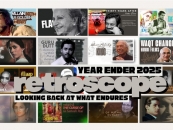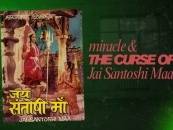-853X543.jpg)
Sunil Dutt – 6th June 1929 to 25th May 2005
by HUMRA QURAISHI May 25 2020, 6:35 pm Estimated Reading Time: 10 mins, 46 secsI had met Sunil Dutt more than once, writes Humra Quraishi in her piece this week, where she recalls one such time when she interviewed him in Delhi.
As far as I can recall I had met Sunil Dutt on four different occasions in New Delhi, after he had joined active politics.
Details of all of those meetings are very much intact in my head; after all, it is difficult to forget personalities like him because they have a profound impact upon your psyche. My first meeting with him was in the mid-1990s.
In fact, let me describe my first meeting with Dutt sahib as I share a detailed interview, which I did with him. With an appointment in place, I reached his official bungalow on New Delhi’s Safdarjung Lane. Mind you, I had managed to get an appointment for this interview after weeks of calling his office and after I was told repeatedly by his staff that Dutt sahib is too busy on week days and during weekends he goes to Mumbai.
The drawing room in his official bungalow, where I was made to sit, seemed a bit plain and bare. Besides routine furniture, there was nothing much in that room except one wall full of photographs. The wall I’m talking about was decorated with 33 framed photographs: Sunil Dutt with Nargis, with the children and his grandchildren, with three generations of the Gandhi family, with Mother Teresa, with President Reagan, with Jimmy Carter, with jawans at the border areas and more. Then, there were many pictures of Nargis receiving various awards and also a photograph in which actor Rekha was visiting the Dutt home in Mumbai.
.jpg)
And if you readers are wondering how on earth I found so much time to sit and count the photographs and to get into such detailing, I have to tell you this: Though the appointment for the interview was fixed for 11.30am on that day, Dutt sahib hadn’t returned from Parliament therefore I had little choice but to wait for him. His PA, one Mr Sharma, sat and conversed with me and told me, ‘Dutt sahib has given us strict instructions that the office staff here, has to be very kind to cancer patients, drug addicts and to journalists.’
It was after about an hour that Dutt sahib arrived and gave me an explanation for the delay, ‘Parliament mein tha.’
Then half way through my interview with him, Raj Babbar dropped by and he didn’t sit quietly, rather he tried making himself a part of the interview; coming up with choicest quips, until of course, enough hints were dropped, which drove him to leave.
And with that I could continue with my interview.
Have you recovered from the trauma of your son, Sanjay’s arrest and imprisoned for 19 days under TADA? Why do you think TADA charges were slapped against him when your lawyers had specified it was a case of arms offence?
Looking directly at me and without taking a pause he said, “Its been extremely shocking for us and I don’t think we’ll ever be able to recover from it. This can’t ever be washed away from our minds. At times I think that, is this what we have got in return for all that we have done for the country? You punish a person who is yet to be proved guilty and whose family has done whatever was possible for their motherland? What else do I say! I shouldn’t be talking about it at this stage because the case is going on at the Bombay High Court. Also, any comments made by me can be played up by vested interests.”
I’d furthered the interview, asked him to comment on the theory doing the rounds, that Dutt sahib was being harassed for showing sympathy towards one particular minority community during the Mumbai riots?
Not refuting the theory he added, “Why this propaganda that I’ve worked only for the Muslims? Earlier when I had undertaken the Padyatra from Mumbai to Amritsar, then I suppose it was not for a Muslim cause? It was only for the Hindus and the Sikhs? Even in the Bombay riots I helped whoever was suffering and affected. Obviously when they came to me asking for help, I couldn’t have at first asked them their religion and then got down to helping them. I have always and always helped anybody in pain, in need and anybody who is suffering . Although I have myself been a victim of the Partition and suffered tremendously, my mother taught us never to hate a human being. I have been brought up on this principle and this is the very principle I have passed on to my children.”
I then asked him, if rioting re-occurs in Mumbai would you once again play an active role in relief and reaching out? And to that he looked more than determined and said, “Of course, I would . Why should I change!”
Shifting focus back on Sanjay, Dutt sahib told me, “My son has changed after all this. I think he will never be the same again. In these riots he had tried to provide assistance to victims but now he says to me, ‘Papa I will never do any social work.’ See how sad it is! I don’t want to comment too much on the case at this stage but I am of the belief that, if he has committed or made a mistake, then law should take its own course. But don’t come up with filthy allegations against us. Such allegations, which are unimaginable, like people calling us Pakistani agents, Desh Drohis? You cannot imagine how it feels. Those days wherever I would go, even peons at lawyers’ chambers said to my face – ‘desh drohi aa raha hai.’ In fact, once my daughters had gone out shopping and they told me that the moment they stepped into a shop there was silence and the rest of the shoppers had started to walk out. Can you imagine even my wife who is no more in this world was dragged into all this! I could hear people say that his (Sanjay’s) mother was a Muslim. I told people, that you can stab Sanju and me in the back as much as you want but at least spare the dead or if you have to talk about Nargis then remember her for the work she did for spastics, for the blind? Nargis worked for children. There was no religious angle to her work. Look what all we did for the country. During the two wars we went to border areas to meet jawans and those days, around 1962, when we were financially hard up, I’d donated I lakh towards the PM’s relief fund. I am ready to do anything for my country.”
.jpg)
When I asked him about how he’d dealt with that phase when allegations were heaped on him, his family and son, he told me, “Nothing really. In fact, I have told myself often, that time alone will tell them the truth. Also, where did I have the time to prove our innocence? During this crisis I would sleep barely two hours every night. I would get up by 4am and be out by 5am in the morning, to meet lawyers. In fact, when my home was being searched by the Police for two days, I wasn’t even there; they’d conducted all those searches in my absence.”
Sunil Dutt sahib had also told me that, after Sanjay was arrested he had approached and met everybody possible, yet it took nineteen days for Sanjay to be released. He said, “Only a few friends stood by us during that crisis - from the Congress it was VC Shukla, Rajesh Pilot, Pranab Mukherjee, Arjun Singh and Jagdish Tytler. From BJP it was Shatrughan and Jaswant Singh. From the Janata Party it was Sharad Yadav. And yes, Chandra Shekharji had also called me. As for the film industry I had Dilip Kumar, Rajendra Kumar, Pran saab and also some members from the South India Film Chambers by my side.“
He looked pained as he recounted that he did not get any support from Bollywood, “There were only three or four friends from the film industry, who stood by me. The rest labelled Sanju as guilty even before the courts could do so.”
Suppose you were not a MP and not so well connected and also a person who belonged to the minority community, I asked him; then can you visualize how much tougher it would have been for you and for Sanju?
‘Not really, for even in our case people did not spare us the trauma of coming up with allegations like Sanju’s mother was a Muslim. But then, there are still strong secular forces in the country, which are capable of stopping this decay. In Bombay it was secular forces which saved us from many disasters.”
Was he frustrated with the way the political system was functioning - more so as he had even threatened to resign when Mumbai riots were at the peak? “Yes, I was definitely feeling very guilty, for even though I was/I am an elected Member, I couldn’t do much in my constituency for my people. I had entered politics to serve people and yet I felt so helpless because of political tamashas taking place. All of it reflects the decay in our society, as politicians don’t come from outside the social construct. They are part of the same society.”
And when I asked him about his friends in political circles, he was rather diplomatic. “I have no enemies. I am friends with everybody. Also, I believe that nobody is your enemy except your destiny. Yes, destiny has been rather tough on me, thapere khain hain zamanai ke. But I suppose one has to fight, to go on with life. Right from my childhood it has been a struggle but what has happened to my son, I couldn’t ever think of. These are tests of life.”
I ended the interview with asking him this vital question: Any possible solution for the ongoing communal cum civil strife? “Yes, there can be a solution,” he said. “Only last night I was going through the latest Time magazine and horrific images of war ridden Somalia shocked me so much that I couldn’t eat dinner. Those pictures of human beings dying, sitting injured and sick, crawling, rendered so frail and weak, that they cannot walk. These human disasters have happened because of the ongoing civil strife in Somalia. And now I am going to suggest that these images be displayed all over our towns and cities, at public places and be given this caption - See what internal war or strife or unrest can do to you, to your country, to your fellow countrymen.”




-173X130.jpg)
-173X130.jpg)

-173X130.jpg)
-173X130.jpg)
-173X130.jpg)
-173X130.jpg)
